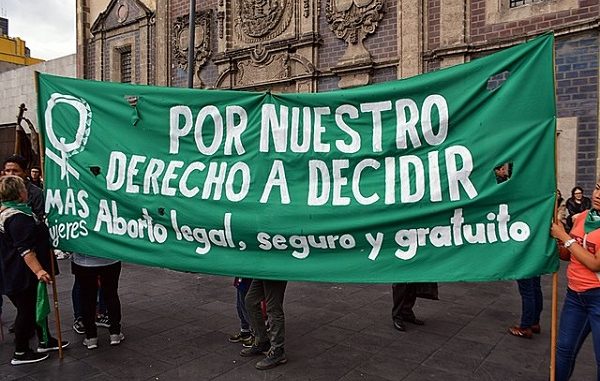
On December 30, 2020, the Argentine Senate voted in favour of a law legalizing free abortion previously approved in the Chamber of Deputies. The approval was resolved with 38 votes in favour, 29 against and one abstention. Two conservative politicians opposed to the law were absent: former president Carlos Menem, who was hospitalized seriously ill and later died, and another senator who was absent due to a rape accusation against him for which he was under investigation. Hundreds of thousands of anxious women waited in the streets for the result.
For months the government’s story in Argentina was that the pandemic situation of Covid-19 did not allow the discussion of the law in the Senate. However, the renegotiation of the debt payment with the IMF, the associated anti-people austerity measures threat to provoke a rupture with the most progressive wing of the Peronists, and the spectre of a wave of massive social protests, similar to those that occurred in Chile, was the context in which the government of Alberto Fernández decided to rescue the bill and present it for discussion in the Senate.
The legislation on abortion in Argentina, previous to the new law, was enacted in 1921. As in other countries, it was permitted on two grounds only: rape and risk to the woman’s health. This legislation was repealed by the military dictatorship installed in power in March 1976, which instead reinstated a provision of the previous dictatorship of General Onganía that criminalized abortion completely. The 1921 legislation came back into force by the decision of Congress with the end of the dictatorial regime.
Latin America is the continent with the most restrictions on voluntary termination of pregnancy. In an international context of social mobilizations, the working women’s movement has been decisive in the victory represented by the approval of the law for the voluntary interruption of pregnancy – free abortion in Argentina. It will undoubtedly have the effect of accelerating the struggle in other countries. Argentina is the third biggest country in the region.
This new law is the result of 30 years of mobilization and struggle of fighting women’s organizations, with the support of the left, which became a gigantic widespread social movement, especially among young people and the working class and poor sections of society. The press christened this movement for the legalization of abortion the ‘Green Tide’ because the movement was identified with green scarves associated with health. It has not been easy in a country where the Catholic Church, very conservative and opposed to the right to abortion, has wide networks of influence, especially with the oligarchic sectors and the bourgeois political apparatuses
The Catholic Church hierarchy
The Argentine Catholic Church hierarchy showed sympathy for the brutal military dictatorship. Before leaving power in December 1983, the military made sure to unambiguously criminalize abortion rights. There were subsequent revelations of massive human rights violations, including the kidnapping of babies from the families of the disappeared detainees who were pregnant or had young babies. The multiple allegations of sexual abuse by the clergy, as well as the ongoing struggle of mothers and grandmothers to find the whereabouts of their relatives, increased the discrediting of both the military and the church in broad sectors of the population.
The Catholic Church has paid an big price; the clergy can no longer present themselves as the credible custodians of higher moral values. The latest surveys show that the majority of the population recognize themselves as Catholics by a very narrow margin, while evangelical believers and agnostics or non-believers have increased. How different the situation was fifty years ago when about 95% of the population was Catholic. Attendance at Catholic services is very low and, in general, people prefer a private, personal relationship with their beliefs without intermediaries. Not even the election of Pope Francis, a native of Argentina, did much to lift the ailing Catholic Church in the country.
Two years ago, the Senate of the Republic voted against this social demand for abortion. During the rallies prior to the vote last year, and during the protests against abortion, the growing strength of the Green Tide was evident. Many senators changed their vote on this occasion. Nevertheless, in order to ensure a favourable majority, the government had to introduce changes that recognized the right to conscientious objection on the part of Catholic clinics and hospitals.
Victory opens doors
This victory opens the door to winning many other changes to the way the patriarchal society in Argentina still oppresses women – lower salaries than men, double working hours, unequal responsibility for the care of children and family members, limited access to leadership and positions of responsibility in companies and in society, to mention just a few.
Latin America has been living in a state of social ferment for the last two years. In several countries, it has been possible to speak of elements of a pre-revolutionary situation. Women activists, youth, students, workers and people of the poor neighbourhoods have come together with working-class and local youth around common demands and aspirations. They are a fundamental part of the generation of anti-capitalist and anti-patriarchal movements that question the status quo. We can rightly say that there will be no social revolution without women.
